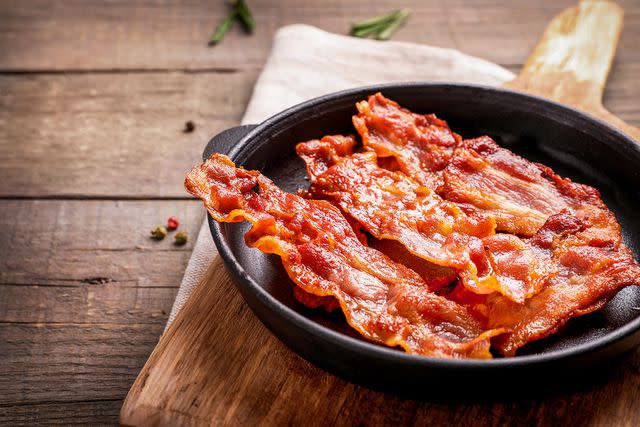High-Fat Keto Diet Helped 69% of Bipolar Patients in New Study
The popular weight-loss plan may be beneficial in addition to traditional treatment, new research says

Getty
Stock image of keto diet foodsThe keto diet may help those with bipolar disorder and schizophrenia, a new study says, with 69% of those with bipolar disorder seeing an improvement after going on the diet.
A four-month study of 23 people — most with bipolar disorder, but some with schizophrenia — has “shown promise in the treatment of psychiatric illness,” the report, published in Science Direct, says.
Using the Clinical Global Impressions scale — which the National Institute of Health explains is a way for “the non-researcher clinician to quantify and track patient progress and treatment response over time" — the study found that for bipolar participants, the “severity of mental illness assessments show average improvement of 31%” with “the severity of mental illness (through CGI assessments) showed improvements of >1 point in 69% of participants.”
“Psychiatric outcomes for the full cohort include an average of 17% improvement in life satisfaction,” the study says.

Getty
Stock image of baconBipolar disorder, the Mayo Clinic explains, is “is a mental health condition that causes extreme mood swings that include emotional highs (mania or hypomania) and lows (depression).”
Schizophrenia is “a serious mental disorder in which people interpret reality abnormally,” the Mayo Clinic explains, adding that it “may result in some combination of hallucinations, delusions, and extremely disordered thinking and behavior that impairs daily functioning, and can be disabling.”
Related: Mädchen Amick Reveals Son Sly's 'Scary' Bipolar 1 Diagnosis: 'It Was Traumatic'
And while there are treatments for these disorders, the study points out that “many individuals can experience treatment resistance, or major metabolic side effects, which can result in non-adherence of prescribed treatments.”
That’s why researchers looked to the keto diet, a low-carb, moderate protein and high-fat eating plan. It's been used to help patients with epilepsy and diabetes, and has grown in popularity for weight loss.
Never miss a story — sign up for PEOPLE's free daily newsletter to stay up-to-date on the best of what PEOPLE has to offer, from juicy celebrity news to compelling human interest stories.
“The working theory is that we’re providing energy to the brain that circumvents these metabolic deficits,” Shebani Sethi, clinical associate professor of psychiatry and behavioral sciences at Stanford Medicine and the lead author of the study, told The Washington Post.
As a result of doing the keto diet for four months, the study found that “79% of participants with baseline symptoms experienced clinically meaningful improvement.”
Related: Demi Lovato Was 'Relieved' to Be Diagnosed as Bipolar to Treat Her 'Extreme Lows' from Depression
The study’s authors point out that keto should supplement — not replace — traditional treatment.
“Our results show that a ketogenic diet intervention is a feasible and acceptable supplemental treatment to neuroleptic medication,” the study says, advocating for “further research into the relationship between mental health and metabolic health.”
For more People news, make sure to sign up for our newsletter!
Read the original article on People.

